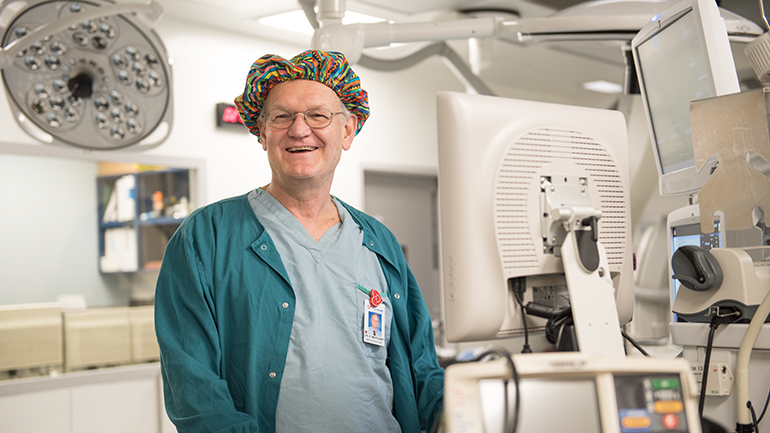
Dr. Richard Merchant, Anesthesiologist, Royal Columbian Hospital, was a pioneering player in the development of the Enhanced Recovery After Surgery protocol.
Dr. Richard Merchant has been an anesthesiologist – and change agent and innovator – at Royal Columbian Hospital for more than 25 years, most recently as a ground-breaking player in the development of the Enhanced Recovery After Surgery protocol.
But he almost wasn’t a doctor. The Vernon-native planned to be a physicist in his youth, until the influence of his family physician changed his course from the study of matter and motion to medicine.
“I never intended to go into medicine,” Dr. Merchant admitted. “But my family doctor showed me you could care for patients and develop relationships and have a good life out of it. It’s not an easy job. It’s not a nine-to-five job, not to do it well. It’s a calling. You do it to make a difference.”
And he has.
Since he joined the hospital in 1991, Dr. Merchant has helped set up the cardiac surgery program, served as department coordinator for cardiac anesthesia, and department coordinator for research and for resident trainings. In 1994, he helped pioneer the Rapid Surgical Recovery protocol for cardiac surgery, a model of perioperative patient care designed to return patients rapidly to their baseline health, which later became known as Enhanced Recovery After Surgery (ERAS). This initiative has led to length of stay for these patients dropping by 50 per cent from an average of eight days to four days, reducing their rate of complications and improving their health outcomes and increasing their satisfaction.
“It was tremendously successful,” Dr. Merchant recalled. “At Royal Columbian, the attitude has always been a ‘We can do it’ one. We went from about 200 to 400 cases per year, we shortened length of stays, and yet we had the same number of beds. That was very gratifying.”
The key to ERAS, Dr. Merchant said is, employees treated patients according to a wellness model. “If you tell people who are going to have a hernia operation they are going to be in hospital for two weeks and they can’t move for the first week then they will do that,” Dr. Merchant explained. “If you tell them they are going to be done as an outpatient with local freezing and they will go home that same day and can manage their pain and nausea this way, and that they will recover quickly, then they will do that. It’s not shortcutting care. It’s better care and it’s higher quality and it’s getting patients engaged in their care.”
Dr. Merchant continues to co-lead this important work, spreading it to other surgery specialities, influencing improvements in the hospital’s quality improvement data and serving as a Fraser Health medical representative to the provincial ERAS working group.
“Throughout his career, he has never lost sight of the patient and their well-being,” said Linda Nelson, clinical nurse specialist for the ERAS program at Royal Columbian Hospital. “He is known for his caring and humourous manner which can put an anxious patient at ease prior to surgery.”
Outside the hospital, he has taken on a key role in education and professional development. He is a clinical professor of anesthesiology, pharmacology and therapeutics at UBC, served 15 years on the executive of the B.C. Anesthesiologists’ Society and has been an active member of the Canadian Anesthesiologists’ Society since 1983.
Over the course of his career, Dr. Merchant has acted as a primary investigator for nine research studies and has helped author more than 40 research publications and commentaries on best practices in peri-operative surgical care and anesthesiology.
“His contribution to the care of patients in Fraser Health has been phenomenal,” said Dr. John Ramsden, head of Royal Columbian's anesthesiology department. “He epitomizes professional generosity and altruism in sharing his knowledge with others. His accomplishments, unpretentiousness and enthusiasm at this stage of his career are inspiring to those who work alongside of him.”
Perhaps inspiring another generation of would-be physicists to become physicians.
